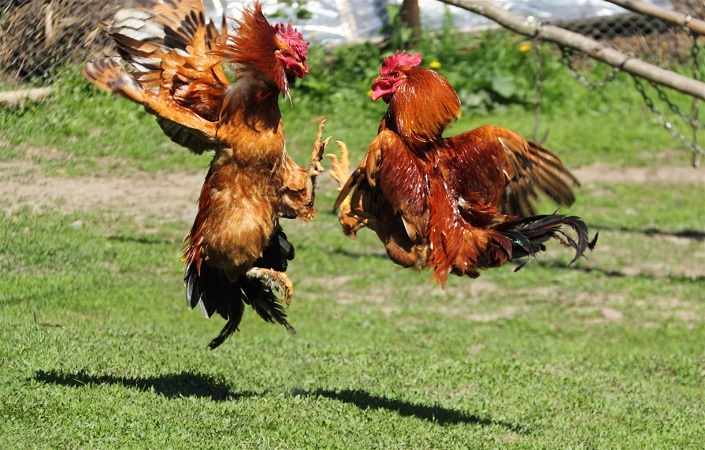

Most issues occur where there are high stocking densities and little opportunity to express natural chicken behavior. So, comfortable, interesting surroundings that provide for chickens’ behavioral needs are key. Moreover, we need to watch out for any behavior problems developing and take action as soon as possible to prevent long-term stress. As chickens learn from each other, the problem could spread throughout the flock if left unresolved.
Chickens in the wild have complex interactions with their surroundings and each other, leading to an active and varied experience of the world. Through domestication, they have adapted really well to human-made environments. However, some artificial systems test their ability to cope, and this can result in behavior problems. Aggression can become serious issues affecting health as well as welfare. We need to know how to stop chickens from pecking each other’s feathers out, how to avoid bullying, and how to make sure that all chickens can access what they need.
Avoiding Aggressive Chicken Pecking
Chickens establish a hierarchy to prevent aggression, with subtle warnings and submissive gestures and only occasional pecks or chasing. However, if the flock is disrupted by unrecognized birds, aggressive pecking will resume until a new ranking is settled. Aggressive pecks are sharp downward attacks to the head of the rival. Roosters give an elaborate display of strength to encourage submission before physical contact is necessary. However, dangerous fighting results if unfamiliar mature roosters are put together.
Competitive Aggression
Social problems can occur if chickens are unable to form a normal hierarchy. This may result from raised flock size or stocking density. Chickens can remember up to about 80 other chickens’ identities. So, in larger flocks, they frequently come across individuals they do not recognize and fighting may break out.
In confined spaces, lower ranking individuals may suffer both bullying and loss of access to food, water, roosts, nesting boxes, etc., and may end up losing condition. Overstocking can increase frustration and competition—the pecks may fly—with the alpha hens ruling access to resources. If necessary, reduce stock or enlarge runs and introduce more roosts, hiding places, feeders, and environmental enrichment.
Mating Aggression
A study identified broiler roosters who injured or killed their mates during mating. These males did not perform the ritual mating dance, due to a genetic fault where courtship behavior had been inadvertently bred out. More commonly, young subordinate males may attempt a sneaky mating while the dominant rooster is not looking and neglect the courtship ritual. The hen usually objects and calls to the alpha male to rescue her.
Aggression Towards Humans
Finally, you may find aggressive chicken behavior with Humans from roosters who have lost their fear of people and view them as competitors. This sometimes occurs with hand-raised cockerels as they mature. A helpful approach is to hold your ground, wave your arms.
 Contact Jaguza Support
Contact Jaguza Support